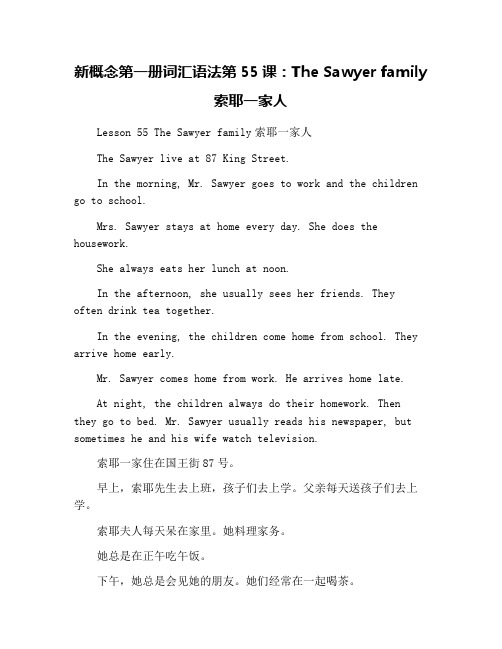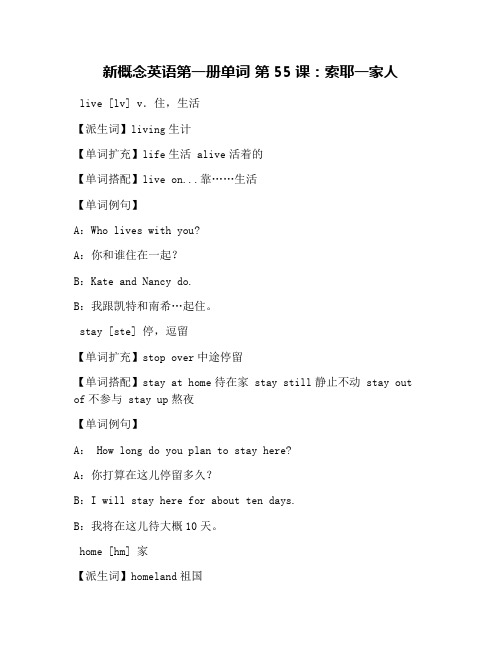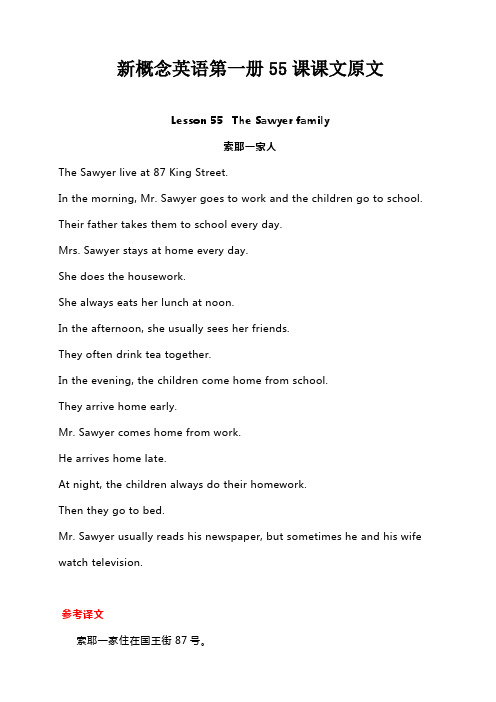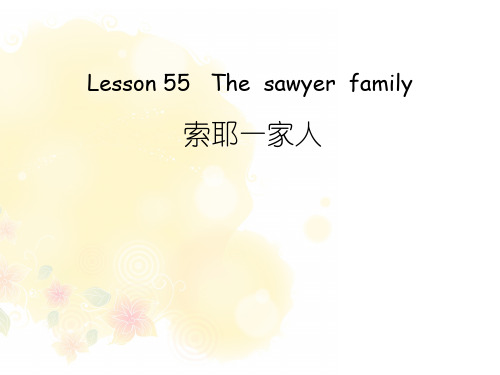新概念第一册55课
新概念第一册第55课

时间频度副词的位置
3.在加强语气的句子里,许多副词可以放在第一个助动
词之前,或be动词之前,或者放在句首。如: Usually I go to visit my grandparents on weekends.
4. 在否定句中,频度副词放在not的前或后要依意思来
决定。如: The climate is not always pleasant. The climate always isn’t pleasant.
—He is going there July 28th.
A. on B. at C. in D. to
8. — does it take inutes.
A. How long B. How much C. How often D. How many
练习题
1. Tom is a worker. He _____ in a factory. His sisters ___ __ in a hospital. A. work/ work B. works/ work C. work/ works 2. Who _____ English best in your class? A. speak B. speaks C. speaking 3. Mrs.Read _____ the windows every day A. is cleaning B. clean C. cleans 4.4. We _____ music and often _____ to music. A. like/ listen B. likes/ listens C. like/ are listening
2. stay with sb 和某人在一起 下次来就住在我们这好吗? Why don’t you come to stay with us?
新概念英语第一册55课

2. ( B )Jim’s brother ____ in a factory. He usually _____ to work by car.
A. work, go B. works, goes C. works, go D. work, goes
3.( A) ____ you always ____ basketball on Sundays? A. Do, play B. Does, play C. Are, playing D. Are, play
Read the passage and answer these questions:
1.Where do the Sawyers live? They live at 87King Street.
2.In the morning, what does Mr. Sawyer do? What do the children do? What does Mrs. Sawyer do? Mr. Sawyer goes to work. The children go to school. Mrs. Sawyer stays at home and does the housework.
Lesson55
The Sawyer family
Let’s learn new words:
live 住、 生活
live in 住在……大地方(国家或城市) live at 住在……小地方(有确切地址的) at 58 Shengli Road. I live —— in England. He lives ___
Do some exercises:
1. ( c ) I often _____ up at 7:oo in the morning. My mother often _____up at 6:30.
新概念英语单词第一册第55课:索耶一家人.doc

新概念英语单词第一册第55 课:索耶一家人live [lv] v.住,生活【派生】 living生【充】 life生活alive活着的【搭配】 live on...靠⋯⋯生活【例句】A:Who lives with you?A:你和住在一起?B:Kate and Nancy do.B:我跟特和南希⋯起住。
stay [ste]停,逗留【充】 stop over中途停留【搭配】 stay at home待在家stay still 静止不stay out of不参与stay up熬夜【例句】A: How long do you plan to stay here?A:你打算在儿停留多久?B:I will stay here for about ten days.B:我将在儿待大概10 天。
home [hm] 家【派生】 homeland 祖国【单词搭配】 at home 在家 go home 回家【单词例句】A:I must go back home where many things are waitingfor me to settleB: We're very sorry to see you go.A:我必须回国了,很多事正等着我去处理。
B:您要走了,我们感到非常遗憾。
housework['hauswa :k] 家务【单词构造】 house(房子) +work(工作) = housework (家务)【单词搭配】 do the housework做家务【单词例句】A: My mother always says I spend too much timeon watching TVA:我妈妈总是说我把太多的时间花费在看电视上。
B: Then you should finish your homework, and thenhelp your parents with the housework some day.B:那你以后应该先完成家庭怍业,然后帮父母做些家务。
新概念英语第一册第55课课件

stay v. 呆在,停留(是指临时,短时间的居住)
stay in …… 呆在家里不出去 (尤其指呆在家里不出去)
eg: They always go out to the club at night,but I
stay in and watch TV. stay with sb……和某人呆在一起。 eg: She stays with me.她和我呆在一起。
6) T: What does she usually do in the afternoon? S: She usually sees hers friends.
7) T: When do the children come from school? S :In the evening .
8) T: When do the children do their homework? S: They always do it at night.
arrive v. 到达 arrive in 后面一般接城市或国家 arrive in France arrive 后面可直接加副词 arrive here arrive there arrive home arrive at 后面接的地点,一般是公共场所或某座大楼。 arrive at the hotel
他们经常在一起喝茶
In the evening,(在傍晚) the children come home from school. 孩子们放学回家
They arrive home early 。(副词修饰动 他们到家很早
Mr. Sawyer comes home from work. 索耶先生下班回家
9) T: What does Mr. Sawyer usually do at night? S: He usually reads his newspaper.
新概念英语第一册第55课

• nnigighhtt 一n般. 指夜夜间里 • 晚安 • good night • 在夜里 • at night • 一整夜 • all night • =the whole night • He always does his
stay with sb和某人呆在一起。 她总是和我呆在一起。
eg: She always stays with me.
欧姆龙贸易(上海)有限公司
home
n. 家 ;adv. 住家,到家 1) n. 家 欢迎来我家
eg: Welcome to my home . 在家
at home 呆在家
stay at home 她总是呆在家
• •
我W们e 通u常su在aulls家yuad做loly我ou们r 的hao家dmv庭e.w作通or业常k 。at
home .
• 她通常在晚上打扫房间。
• eg: She usually cleans her room in the evening .
• together adv. 一起
• 一起做某事
She always eats her lunch at noon 。(在正午)
欧姆龙贸易(上海)有限公司
In the afternoon, (在下午 )
she usually sees her friends 。
他总是会见他的朋友 They often drink tea
together.
他们经常在一起喝茶
新概念第一册55课

What do they do in the evening? They sometimes watch television in the evening.
What does she do at noon? She always eats her lunch at noon.
What does he do in the evening? He often reads his newspaper in the evening.
Look at the short video and then answer this question.
When do the Children do their homework ?
NEW WORDS
live stay home [ lɪv] v. 住,生活 [steɪ] v.呆在,停留 [həum ] n. 家;adv. 在家 n. 家务
{
eg.1) 这架飞机5点抵达伦敦。
The plane arrived in London at 5 o’clock. 2) 我们三点到了火车站。 We arrived at the station at 3 o’clock.
Grammar
The third person singular(单数第三人称)
The subject (主语) : he/she/it Mary /Tom/my father /my brother the cat/the girl/the boy… The predicate verb(谓语动词): verb→verb+-s/-es
[ə’raɪv] v. 到达
night
[naɪt ]
n.夜间
住,生活 live
(英音版)新概念英语第一册第55课:The Sawyer family

(英音版)新概念英语第一册第55课:The SawyerfamilyLesson 55:The Sawyer family 索耶一家人Listen to the tape then answer this question. When do the children do their homework?听录音,然后回答问题。
孩子们什么时候做功课?The Sawyer live at 87 King Street.In the morning, Mr. Sawyer goes to work and the children go to school.Mrs. Sawyer stays at home every day. She does the housework.She always eats her lunch at noon.In the afternoon, she usually sees her friends. They often drink tea together.In the evening, the children come home from school. They arrive home early.Mr. Sawyer comes home from work. He arrives home late.At night, the children always do their homework. Then they go to bed.Mr. Sawyer usually reads his newspaper, but sometimes he and his wife watch television.New Word and expressions 生词和短语livev. 住,生活stayv. 呆在,停留homen. 家;adv. 到家houseworkn. 家务lunchn. 午饭afternoonn. 下午usuallyadv. 通常together adv. 一起eveningn. 晚上arrivev. 到达nightn. 夜间参考译文索耶一家住在国王街87号。
新概念一册55课

刮胡子
listen to the stereo 听收音机
clean the blackboard
擦黑板 go to bed 上床睡觉
wash the dishes 洗碗 type some letters
打字
drink some milk 喝牛奶 watch TV 看电视
eat her lunch
新课文学习
1.live v. 住,生活 你住在哪里? Where do you live? Live and learn. 活到老,学到老。
live in + 国家名/城市名 I live in England. She lives in Shanghai. 我生活在英格兰,她生活在上海。 live at + 确切的地址 John lives at 66 King Street.
4.Then they go to bed.
然后他们就上床睡觉。 词汇注解: go to bed 上床睡觉(指的是动作行为) go to sleep 入睡,睡着 他两点钟睡着 了。 He went to sleep at two o'clock.
★在work,school, bed之前不能加定冠词the. Their father takes them to school every day. 他们的父亲每天送他们去上学。 Mr. Sawyer comes home from work.
吃午饭 read his newspaper
看报纸
What do you usually do ?
到达
那个人已经抵达法国。
1.What does Mrs. Sawyer do in the afternoon?
新概念第一册词汇语法第55课:The Sawyer family索耶一家人

新概念第一册词汇语法第55课:The Sawyer family索耶一家人Lesson 55 The Sawyer family索耶一家人The Sawyer live at 87 King Street.In the morning, Mr. Sawyer goes to work and the children go to school.Mrs. Sawyer stays at home every day. She does the housework.She always eats her lunch at noon.In the afternoon, she usually sees her friends. They often drink tea together.In the evening, the children come home from school. They arrive home early.Mr. Sawyer comes home from work. He arrives home late.At night, the children always do their homework. Then they go to bed. Mr. Sawyer usually reads his newspaper, but sometimes he and his wife watch television.索耶一家住在国王街87号。
早上,索耶先生去上班,孩子们去上学。
父亲每天送孩子们去上学。
索耶夫人每天呆在家里。
她料理家务。
她总是在正午吃午饭。
下午,她总是会见她的朋友。
她们经常在一起喝茶。
傍晚,孩子们放学回家。
他们到家很早。
索耶先生下班回家。
他到家很晚。
晚上,孩子们总是做作业,然后去睡觉。
索耶先生总是读报纸,但有时和他的妻子一起看电视。
1.go to work, 上班。
新概念英语第一册单词 第55课:索耶一家人

新概念英语第一册单词第55课:索耶一家人live [lv] v.住,生活【派生词】living生计【单词扩充】life生活 alive活着的【单词搭配】live on...靠……生活【单词例句】A:Who lives with you?A:你和谁住在一起?B:Kate and Nancy do.B:我跟凯特和南希…起住。
stay [ste] 停,逗留【单词扩充】stop over中途停留【单词搭配】stay at home待在家 stay still静止不动 stay out of不参与 stay up熬夜【单词例句】A: How long do you plan to stay here?A:你打算在这儿停留多久?B:I will stay here for about ten days.B:我将在这儿待大概10天。
home [hm] 家【派生词】homeland祖国【单词搭配】at home在家 go home回家【单词例句】A:I must go back home where many things are waiting for me to settleB: We're very sorry to see you go.A:我必须回国了,很多事正等着我去处理。
B:您要走了,我们感到非常遗憾。
housework['hauswa:k]家务【单词构造】house(房子)+work(工作)= housework(家务)【单词搭配】do the housework做家务【单词例句】A: My mother always says I spend too much time on watching TVA:我妈妈总是说我把太多的时间花费在看电视上。
B: Then you should finish your homework, and then help your parents with the housework some day.B:那你以后应该先完成家庭怍业,然后帮父母做些家务。
新概念英语第一册55-56课详解

新概念英语第一册55-56课详解Lesson 55-56 of New Concept English Book 1 Detailed Explanation.Lesson 55: The Sawyer Family.Vocabulary and Expressions:live [lɪv] v.: This verb has multiple meanings. Firstly, it can mean to reside or habitually inhabit a place. For example, "I live in Hefei." Secondly, it can mean to exist or be alive, as in "People cannot live without air." Lastly, it can be used in the expression "live a/an... life" to describe the way someone lives their life.stay [steɪ] v.: This Verb primarily means to remain in a place for a period of time. It can also be used figuratively to mean "remain" in a certain state or condition, as in "stay hungry, stay foolish."home [həʊm] n./adv.: As a noun, it refers to the place where one lives. As an adverb, it means "to the place where one lives," as in "go home."housework ['haʊswɜːk] n.: This noun refers to the tasks related to maintaining a household, such as cleaning, cooking, and laundry.lunch [lʌnʃ] n.: This noun refers to the meal eaten in the middle of the day.afternoon [ɑːftə'nuːn] n.: This noun refers to the period of time between noon and evening.Text Explanation:Lesson 55 introduces the Sawyer family and their daily routine. The lesson begins by introducing the family members and their occupations. Mr. Sawyer works in an office, while Mrs. Sawyer stays at home. The children go to school. The lesson then goes on to describe their eveningactivities. Mr. Sawyer usually arrives home from work at about five o'clock, and the family then has their lunch together. In the afternoon, they often have a rest, andthen in the evening, they usually stay at home and watch television.Grammar Points:The use of "-s" or "-es" to form the third-person singular present tense of verbs is reinforced in this lesson. For example, "Mr. Sawyer usually arrives home from work at about five o'clock."The use of prepositions with "live" is also introduced. For example, "Mr. Sawyer lives in a town near London,"where "in" is used with a large place, and "Mrs. Sawyerlives at 87 King Street," where "at" is used with aspecific address.Lesson 56: What Do They Do?Vocabulary and Expressions:together [tə'geðə] adv.: This adverb means "in a group" or "side by side."evening ['iːvnɪŋ] n.: This noun refers to the time of day that comes after afternoon and before night.arrive [ə'raɪv] v.: This Verb means to reach a destination after a journey.night [naɪt] n.: This noun refers to the period of time from sunset to sunrise.Text Explanation:Lesson 56 continues the theme of the Sawyer family's daily life by asking the question, "What do they do?" The lesson provides information about the family's evening activities. Mr. Sawyer usually arrives home from work at about five o'clock, and then the family has their tea together. After tea, they usually sit in the living room and watch television. Sometimes, they go to the cinema orto the theater. On Sundays, they often go for a walk in the park.Grammar Points:The present tense of verbs is reinforced in this lesson, particularly the use of the third-person singular form.The lesson also introduces the use of modal verbs such as "can" and "usually" to express ability and frequency.Conclusion:Lessons 55 and 56 of New Concept English Book 1 focus on the Sawyer family's daily routine and activities. These lessons introduce new vocabulary and expressions related to family life, daily activities, and grammar points such as the use of "-s" or "-es" in the third-person singular present tense and the use of modal verbs. By learning these lessons, students can improve their understanding of family life in English-speaking countries and enhance theirlanguage skills in areas such as vocabulary, grammar, and comprehension.。
新概念一55课课文及语法讲解 PPT

lesson55 The Sawyer family The Sawyers live at 87 King Street. In the morning, Mrs Sawyer goes to work and the children go to school. Their father takes them to school every day. Mrs Sawyer stays at home every day. She does the housework. She always eats her lunch at noon. In the afternoon, she usually sees her friends. They often drink tea together.
主系表:主语 主系表:主语+be(am、is 、 are)+其他 ( 、 ) 其他
用be动词填空 动词填空 1. 2. 3. 4. 5. He ____ an actor. We _____hungry. Sally ____tall. Tim _____free. Lilly and Lisa ____ twins.
lesson55 The Sawyer family 87 King Street The Sawyers live at______________.
Children
go to work go to school go to bed take to stay at home do the housework do homework eat lunch see friends drink tea come home from school\ work arrive home read newspapers watch television
新概念英语第一册55课课文原文

新概念英语第一册55课课文原文Lesson 55 The Sawyer family索耶一家人The Sawyer live at 87 King Street.In the morning, Mr. Sawyer goes to work and the children go to school. Their father takes them to school every day.Mrs. Sawyer stays at home every day.She does the housework.She always eats her lunch at noon.In the afternoon, she usually sees her friends.They often drink tea together.In the evening, the children come home from school.They arrive home early.Mr. Sawyer comes home from work.He arrives home late.At night, the children always do their homework.Then they go to bed.Mr. Sawyer usually reads his newspaper, but sometimes he and his wife watch television.参考译文索耶一家住在国王街87号。
早上,索耶先生去上班,孩子们去上学。
父亲每天送孩子们去上学。
索耶夫人每天呆在家里。
她料理家务。
她总是在正午吃午饭。
下午,她总是会见她的朋友。
她们经常在一起喝茶。
傍晚,孩子们放学回家。
他们到家很早。
索耶先生下班回家。
他到家很晚。
晚上,孩子们总是做作业,然后去睡觉。
索耶先生总是读报纸,但有时和他的妻子一起看电视。
新概念英语第一册第55课

孩子们总是做作业 (do one's形物代 homework)
Then they go to bed.
然后去睡觉。
Mr. Sawyer usually reads his newspaper。
索耶先生总是读报纸。
可数 read a newspaper 读一张报纸
but sometimes he and his wife watch TV.
Their father takes them to school every day.
把某人带到某地 take sb to sp My mother often takes me to the park,
Mrs. Sawyer stays at home(呆在家)everyday. She does the housework.(料理家务)
She always eats her lunch at noon 。(在正午)
In the afternoon, (在下午)
she usually sees her friends 。 他总是会见他的朋友 They often drink tea together.
他们经常在一起喝茶
In the evening,(在傍晚) the children come home from school. 孩子们放学回家
home n. 家 ;adv. 住家,到家 1) n. 家 欢迎来我家
eg: Welcome to my home . 在家
at home 呆在家
stay at home 她总是呆在家
eg: She always stays at home. 2)adv. 住家,到家(副词前不能加介词) 3)回家 4)go home 到家
新概念英语第一册-55-56课课件

学习英语常用表达
详细描述
Text B包含了一些英语常用表达和句型,通过学习这些表达和句型,学生可以更好地掌握英语口语和写作技巧,提高英语应用能力。
Text B
了解英国教育体系
总结词
Text C介绍了英国的教育体系,包括小学、中学和大学的教育体制、课程设置和教学方式等,旨在帮助学生更好地了解英国的教育情况。
Vocabulary exercises
Multiple choice: Choose the correct meaning of a given word from a list of choices.
Vocabulary exercises
Lesson 56 Vocabulary Exercises
Reading exercises
Writing Practice
07
Writing guidance
Introduction
Task Description
Example
Assessment Criteria
Provide a brief overview of the writing task and its importance.
This tense is used to talk about an action that started in the past and is still continuing in the present. It is formed by using "have been" + -ing form of the verb.
提高听、说、读、写能力
本课程注重全面提高学生的英语能力,通过大量的听力、口语、阅读和写作练习,帮助学生提高英语的实际应用能力。
新概念英语第一册第55课

lunch
早餐
breakfast 晚饭 supper
n.
n.
午饭
n.
吃早餐/午饭/晚饭
have breakfast/ lunch /supper
afternoon
n. 下午
morning /evening 早上/晚上 在早上/中午/晚上 In the morning/afternoon/ evening
Language points
1.the Sawyers
the + 姓氏+ s = the + 姓氏 + family
2.go to work \ school \bed \ hospital 3.take sb to sp e home from school \ work 5.arrive home early \ late 6.read a newspaper 7.watch television \ TV
home n. 家 ;adv. 住家,到家 1) n. 家 欢迎来我家 eg: Welcome to my home . 在家 at home 呆在家 stay at home 她总是呆在家 eg: She always stays at home. 2)adv. 住家,到家(副词前不能加介词) 3)回家 4)go home 到家 come home 她经常到家很晚。 eg: she always comes home late. housework n. 家务 做家务 do the housework 家庭主妇 housewife
⑧do their homework
What do\does+someone+(频率副词)+do+时间状语? 某人通常在某个时间做什么? 他们早晨通常做什么?
新概念第一册 第55课

中间 干净的 空的 不整齐的 再说一遍
照耀 步行 照片 山谷 大楼 在…之间 之间
河岸 沿着 努力地 涂画 书架
前面 掉下 花瓶 沸腾
茶壶 老板 请求 书写 糟糕的 新鲜的
告诉 牛排 天气 宜人的 有时候 总是
掸掉灰尘 爬 横过
最喜欢的
There be 句型
祈使句
单数变 复数
lunch :中餐 breakfast 早餐 dinner/supper 晚餐
用餐have/eat breakfast/lunch/dinner/supper afternoon 下午 evening in 夜间
noon
在某日的夜里用介词on
the morning the afternoon the evening
主+动词(do/does)+其它
当主语是第三人称单数时,动词后面需加以变化 1)直接+s 2)sh,ch,o ,s 结尾+es
3)以辅音+y 结尾,变y 为 i + es,元音+y结尾,直接+s.
改成否定句(don’t/doesn’t) 改成否定句(don’t/doesn’t), 疑问句( 疑问句(Do/Does…?) 1.The Sawyers live at 87 King Street. 2. Mr. Sawyer goes to work.’ 3. The children go to school. 4. Their father takes them to school every day. 5. She eats her lunch at noon. 6. She usually sees her friends. 7. They a0r-rive home early. 8. They go to bed. 9. Mr. Sawyer reads his newspaper.
Lesson55TheSawyerFamily(课件)新概念英语第一册

stay with sb. 和某人待在一起
③ home [həʊm]
eg: go home 回家
adv. 在家 n. 家
④ housework [ˈhaʊsˌwɜːk]
n. 家务
eg: My father is doing housework now.
拓展: housework 家务(不可数名词)
n. 晚上
[ˌɑːftə'nuːn]
n. 下午
Words reviewing
• l_v_ • st_ _ • h_m_ • h_ _ sew_ _k • l_ _ ch
• _s_ally • t_ gethe_ • _v_ning • _rr_v_
• aftern_ _ n
• n_ght
Text learning
Words reading
[lɪv]
v. 生活
[steɪ]
v. 待在,停留
[həʊm]
adv. 在家 n. 家
[ˈhaʊsˌwɜːk]
n. 家务
[lʌntʃ]
n. 午餐
ቤተ መጻሕፍቲ ባይዱ
[ˈjuːʒʊəlɪ]
adv. 通常
[təˈɡeðə]
adv. 一起
['iːvnɪŋ]
n. 傍晚
[ə'raɪv]
v. 到达
[naɪt]
Mrs. Lawyer stays at home every day.
She does the housework.
主谓一致,三 单形式
索耶太太每天待在家里做家务。
She always eats her lunch at noon.
stay at+ 地点 housework [U]n 家务
- 1、下载文档前请自行甄别文档内容的完整性,平台不提供额外的编辑、内容补充、找答案等附加服务。
- 2、"仅部分预览"的文档,不可在线预览部分如存在完整性等问题,可反馈申请退款(可完整预览的文档不适用该条件!)。
- 3、如文档侵犯您的权益,请联系客服反馈,我们会尽快为您处理(人工客服工作时间:9:00-18:30)。
2
In the morning, Mr. Sawyer goes to work and the children go to school. Their father takes them to school every day.
3
Mrs Sawyer stays at home every day. She does the housework.
shop
shopping center:购物中心 shopping mall:大型购物中心 supermarket:超市 go to the shops:逛商店(买东西) go shopping:购物 do some shopping:买东西
moment
at the moment:现在,此刻 for a moment:一会儿 at any moment:任何时候 at the last moment:在最后一刻 in a moment:不久 at the very moment:就在非常的那一 刻 at that moment:就在那一刻
• What does your father/mother do? • What do you do after school everyday? • What do your parents do after work everyday?
Listen to the tape and answer the questions:
语法点:一般现在时
指经常发生,习惯性的动作。 时间状语一般是usually, always, often, every day等 I often go the school by bike. He does his homework every day. He is always late. 注意:主语是第三人称单数时,动词 要加-s
Directions
north
west
east
south
翻译L53
1.广州的气候温和,但也不是很好。 The climate of Guangzhou is mild ,but it’s not very good. 2.我最喜欢春季和秋季。 因为太阳升得迟而 落得早,白天短而夜晚长。 My favourite season is spring and summer. Because sun rises late and sets early .The days are short and the nights are long. 3.天气是我们最喜欢谈论的话题。 Weather is our favourite subject of conversation.
Example:
washes She (wash)________the dishes every day. Exercise go 1.The children (go)_____to school in the moring. 2.Their father (take) takes _____them to school. stays 3.Mrs. Sawyer (stay) ______at home. does 4.She (do) _____the housework. eats 5.She always (eat)____ her lunch at noon.
afternoon 下午 usually adv.通常 together adv.一起 arrive v.到达
Say something about your family Answer these questions with the help of these questions • Where are you from? • How many people are there in your family? • Who are they?
逐句听课文,注意一般现在时动词的 运用与课文关键知识点。
The Sawyer.复数 Go to school ,go to work Do the homework Arrive home late/early
复述课文REPEAT
索耶一家住在国王街87号。
早上,索耶先生去上班,孩子们去上学。 父亲每天送孩子们去上学。 索耶夫人每天呆在家里。她料理家务。 她总是在正午吃午饭。 下午,她总是会见她的朋友。她们经常在 一起喝茶。
Lesson 56 What do they usually do?
dusts the cupboard
makes the bed
shaves
listen
cleans the blackboard
go to bed
washes the dishes
type some letters
drinks some watch television reads her milk eats her lunch newspaper
Mrs. Sawyer stays at home every day. homeless:无家可归 homesick:思乡的 hometown:家乡
lunch 午饭 breakfast supper dinner(较正式,一般指晚宴) meal [mi:l] 餐 have a big meal
1. 2.
Where do the Sawyers live ? What do the children do at night ? What about Mr. Sawyer?
Key Structures
1.Mr. Sawyer stays at home every day. 2.She always eats her lunch at noon. 3.She usually sees her friends. 4.They often drink tea together. 5.The children always do their homework 6. Mr. Sawyer usually reads his newspaper, but sometimes he and his wife watch television.
-- Where do they come from? Are they Chinese? --Yes. They‘re Chinese. They come from China.
They are a family.
Lesson 55 The Sawyer family
New words
7
Mr Sawyer comes home from work. He arrives home late.
8
At night, the children always do their homework. Then they go to bed. Mr. Sawyer usually reads his newspaper, but sometimes he and his wife watch television
Key word
Shop ,restaurant,store Moment At this moment在此刻
Listen to the tape two times and answer the question :
What’s Mr.Sawyer doing today?
Listen to the sentence one by one and analyse it
现在是8点钟。孩子们每天都乘小汽车去上学,而今天, 他们正步行上学。 现在是10点钟。上午,索耶夫人通常是呆在家里的,但 今天上午,她正去商店买东西。 现在是4点钟,下午,索耶夫人通常是在客厅里喝茶, 但今天下午,她正在花园里喝茶。 现在是6点钟。晚上,孩子们通常是做作业,而今天晚 上,他们没做企业。此刻,他们正在花园里玩。 现在是9点钟。索耶先生通常是在晚上看报,但今天晚 上他没看报。此刻,他正在看一本有趣的书。
表述客观规律或事实用一般现在时
The plane can fFra biblioteky in the sky. The earth goes around the sun. He is tall.
Translations
1. Mr. Jones晚上经常在家看电视。 Mr. Jones always watch TV at home. 2.他总是早起。 He always get up early.
4
She always eats her lunch at noon.
5
In the afternoon, she usually sees her friends. They often drink tea together.
6
In the evening, the children come home from school. They arrive home early.
复述课文REPEAT
傍晚,孩子们放学回家。他们到家很早。 索耶先生下班回家。他到家很晚。 晚上,孩子们总是做作业,然后去睡觉。 索耶先生总是读报纸,但有时和他的妻子 一起看电视。
Lesson 57
课文重点
注意一般现在时和现在进行时的运用。 They usually… They are doing..
Ask your partner
What do you usually do in the morning? in the afternoon? in the evening at night? What do you usually do at weekend? in your vacation?
Time
What’s the time?/What time is it? It’s … o’clock.(表示整点) past(表示半点前) Ten past seven. Twenty past nine. half(表示半点) It’s half past eight. It’s half past ten.
